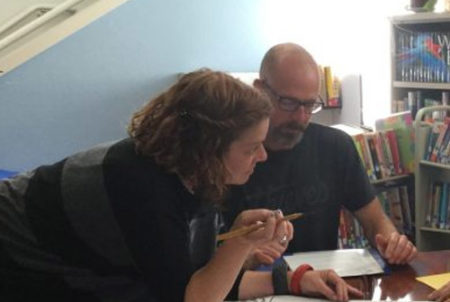This article is part of an ongoing series of how local schools and districts are applying the principles of California’s English Learner (EL) Roadmap. See earlier articles on Live Oak School District’s work and introducing the EL Roadmap.
 Mission Hill Middle School is taking strides towards realizing the California English Learner Roadmap’s vision of all educators sharing responsibility for developing English Learner students’ linguistic and academic capacity. The school is three years into a multi-year professional learning cycle on integrating English Language Development (ELD) across content areas. The professional learning is planned and facilitated by the school’s ELD coach and principal, in collaboration with the COE’s Multilingual Coordinator
Mission Hill Middle School is taking strides towards realizing the California English Learner Roadmap’s vision of all educators sharing responsibility for developing English Learner students’ linguistic and academic capacity. The school is three years into a multi-year professional learning cycle on integrating English Language Development (ELD) across content areas. The professional learning is planned and facilitated by the school’s ELD coach and principal, in collaboration with the COE’s Multilingual Coordinator
The heart of the work is the collaboration and learning that happens when teachers have on-going opportunities to learn about and discuss together new pedagogy, reflect on and share instructional practices, gather and analyze data on how students are learning, and plan to refine instruction.
Mission Hill teachers in all content areas except PE now use a common instructional routine to teach two to four high utility general academic words per unit. Recently, Kat McElwee, principal of Mission Hill Middle School in Santa Cruz, shared what she has observed happening in classrooms this year. “When I do my walk-throughs and tally what I observe, I see teachers using the Direct Instruction Vocabulary Routine, and a slight uptick in teachers providing access for English Learners using language supports like graphic organizers, sentence frames, and word banks.”
Principal McElwee shared the thinking that led to this focus. “Research says the best way to close the achievement gap between English Only and Emerging Bilingual students is to train and support teachers to provide Integrated ELD instruction. The professional literature about teacher learning tells us you need to stick to just a few foci for professional learning for an extended time, because it takes lots of practice to get good at something, and we have a lot of changes in our staffing and new teachers need to be brought into the fold.” She is proud of the fact that your average teacher at Mission Hill can tell you exactly what the site’s three professional learning foci are and have been. “A teacher may not feel they can do it all yet, but they know where the bus is heading. They can see the road map.”
The school’s administrators have set aside 2 out of 4 monthly meetings for this work. One session focuses on learning about and discussing best practices in vocabulary and language instruction for ELs, as well as analysis of student work. The second session is for department Collaborative Teams to plan and prep vocabulary instruction. “The frequency with which Integrated ELD is focused on as well as the direct application to instruction and Collaborative Team work is a model professional learning practice to emulate, as it has had a notable impact on student performance during class,” said Julia Hodges, Director of Secondary Curriculum and Instruction for Santa Cruz City Schools.
The focus on vocabulary instruction is part of the site’s three year implementation plan for Integrated ELD, the ultimate goal of which is for EL, Reclassified EL (and all) students to be able to “use an expanded set of general academic and domain-specific words…to create precision and shades of meaning while speaking and writing.” (CA ELD Standards, Grade 8).
Principal McElwee is hopeful that as a result of this sustained focus on training and supporting teachers to provide Integrated ELD, Mission Hill will see improved scores on district reading and writing benchmarks, as well as state assessments, and most importantly, an improvement in EL student engagement in learning, and as an added benefit, increased teacher empowerment and engagement. She added, “Our doors are open. We welcome feedback and visitors!”
Other articles about the English Learner Roadmap:
Long-term Investment in Accountable Student Talk Paying Dividends in Local District
